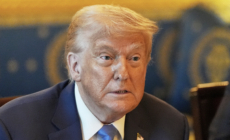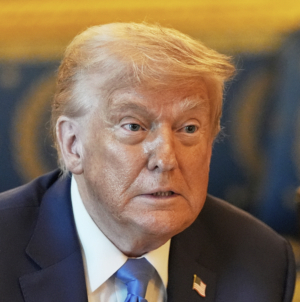-
Donald Trump’s Approval Rating With College Students Gets a Boost—Poll - 10 mins ago
-
Family sues over San Diego police officer found dead outside jail - 17 mins ago
-
Should New York City Ditch Its Party Primaries in Favor of Open Races? - 29 mins ago
-
Greg Abbott Rebukes Question About ‘Blame’ As 161 Still Missing After Texas Flood - 45 mins ago
-
Three Californians, family of former Giants pitcher, missing in Texas flash floods - 58 mins ago
-
‘Superman’ Review: It’s a Bird, It’s a Plane, It’s a Reboot! - about 1 hour ago
-
Yankees Receive Harsh Criticism For Consistent DJ LeMahieu Decision - about 1 hour ago
-
Dorm staffer threatened to bite off deaf student’s finger if he revealed sexual abuse, lawsuit claims - 2 hours ago
-
AEW’s MJF Praises Unpopular WWE Business Practice - 2 hours ago
-
Supreme Court Clears Way for Mass Firings at Federal Agencies - 2 hours ago
Amazon Boycott: What to Know About ‘Calculated Strike’
Amazon is facing a week-long boycott as part of an “economic blackout” led by The People’s Union USA, an advocacy group urging consumers to stop shopping at Amazon and its subsidiaries, including Whole Foods and Twitch.
The boycott, which began on March 7 and runs through March 14, is intended as a “calculated strike” aimed at challenging the retail giant’s impact on small businesses and treatment of workers, according to activist and founder of The People’s Union, John Schwarz.
Why It Matters
The boycott highlights growing consumer efforts to influence corporate behavior through economic activism. By avoiding Amazon purchases for an extended period, organizers aim to demonstrate the collective power of consumers in shaping corporate practices.
While short-term financial effects may be limited, the movement seeks to encourage broader discussions on economic fairness and corporate accountability.

Patrick T. Fallon/Getty Images
What to Know
The boycott encourages consumers to refrain from using all Amazon services, including shopping on its main site and avoiding affiliated businesses such as Whole Foods, Prime Video, Zappos, Ring and Audible, according to a flyer from the People’s Union on Instagram.
Schwarz has emphasized that the movement is not just about Amazon but about fostering economic independence and supporting small businesses.
The People’s Union USA previously led a 24-hour boycott on February 28, which received significant attention but had a negligible effect on Amazon’s overall sales, according to data from Momentum Commerce.
The People’s Union USA describes itself as a non-partisan movement advocating for consumer empowerment. Organizers have framed the boycott as part of a broader effort to shift economic influence away from corporate giants and toward smaller businesses.
Other major companies are also being targeted by similar actions. The People’s Union USA has announced upcoming boycotts of Nestlé from March 21-28 and Walmart from April 7-13, indicating a continued push for consumer-led corporate accountability.
What People Are Saying
John Schwarz, founder of The People’s Union, said in an Instagram post: “Every boycott, every blackout, every stand we take together is shaking their foundation. This moment isn’t just about resistance, it’s about reclaiming what’s ours. Hold the line. Stay strong. The future is in our hands.”
Andrew Waber, lead researcher at Momentum Commerce, told CNET: “I’d say the minimal impact on Amazon sales during the one-day boycott isn’t necessarily surprising… This size makes the retailer naturally resilient, particularly when it comes to short-term disruptions.”
A flyer from The People’s Union on the Amazon boycott states: “For the Amazon Boycott, we are targetting all commercial entities owned, operated or significantly controlled by Amazon and Jeff Bezos.”
What Happens Next
The long-term effects of the boycott remain uncertain, but it reflects a growing trend of consumer activism aimed at reshaping corporate practices. While Amazon’s financial resilience may limit immediate impacts, sustained efforts by advocacy groups like The People’s Union USA could contribute to broader discussions about corporate accountability and economic influence.
Source link
















